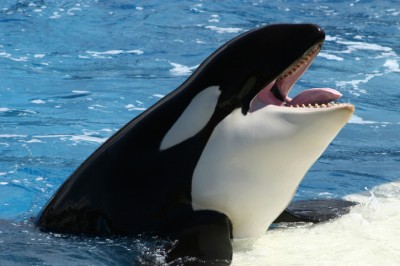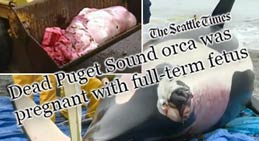100% Death Rate for Baby Killer Whales Along the Canadian West Coast in the Past 3 Years

The Province, Dec 5, 2014 (emphasis added): For an endangered orca population living off the B.C. coast, Thursday’s death of a young adult female “couldn’t be much worse,” according to a marine scientist… “It couldn’t be much worse than losing an 18-year-old female,” [Dr. Peter Ross, a senior scientist at the Vancouver Aquarium] said. “This was a female who was at the sunrise of her reproductive life.”… “There’s virtually no survival of the babies anymore,which of course means there’s no future… We have to turn this around somehow,” said [Ken Balcomb of the Center for Whale Research].
Dr Andrew Trites, U. of British Columbia: “To lose a female of reproductive age, that’s absolutely the worst thing possible that could happen… without them, the population is doomed.”
 Times Colonist, Dec 5, 2014: The death of J32 [and] her baby, paints a grim future for the southern resident whales… Balcomb said. “We haven’t had any survivals in babies for a couple of years. We have had stillborns and newborns die… It’s like zero survival in birth rate here.” Howard Garrett of Orca Network said… “There was a calf born in early September that lived less than a month and that was the first calf in two years… There should be two or three births at least per year… Instead, there have been seven mortalities and no births.”
Times Colonist, Dec 5, 2014: The death of J32 [and] her baby, paints a grim future for the southern resident whales… Balcomb said. “We haven’t had any survivals in babies for a couple of years. We have had stillborns and newborns die… It’s like zero survival in birth rate here.” Howard Garrett of Orca Network said… “There was a calf born in early September that lived less than a month and that was the first calf in two years… There should be two or three births at least per year… Instead, there have been seven mortalities and no births.”
Fox News, Dec 9, 2014: [It’s] thought to be one of only 18 able to reproduce… a calf birthed by an orca in the J, K, or L pod hasn’t survived longer than a year in the last three years.
KUOW, Dec 7, 2014: Scientists determined this weekend that the dead orca… was pregnant when she died… The fetus was already decomposing, suggesting to scientists that the mother was attempting to expel her stillborn calf when she died.
Earth Fix, Dec 7, 2014: Experts believe the young female may have been trying to expel her dead fetus when she herself died. The fetus… was already decomposing. — Balcomb: “Over the last two and a half years we have not had any calves survive and of course 100 percent mortality in offspring is not good for the future.”… Balcomb and others believe that lack of food and high levels of pollution in the orcas bodies are to blame for the low survival rates of the young. There are just 77 southern resident killer whales left.
CHEK, Dec 2014: Biologist [say] a sustainable population needs at least 500 individuals.
 CBC, Dec. 8, 2014: They can live to be 90 or even 100 years of age. — Peter Ross, Vancouver Aquarium: “The alarm bells are starting to ring because we have not had a successful calf born… in almost 3 years.”
CBC, Dec. 8, 2014: They can live to be 90 or even 100 years of age. — Peter Ross, Vancouver Aquarium: “The alarm bells are starting to ring because we have not had a successful calf born… in almost 3 years.”
Michelle Rachel, CETUS: Nov. 29… she was healthy [&] happy… We don’t know how she got up here, why she got up here. It’s so far away from her regular range.
Balcomb: We’re going to lose this population… they’ll be extinct for sure in 100 yrs, maybe 20
Watch CTV’s extensive coverage of the orcas here

